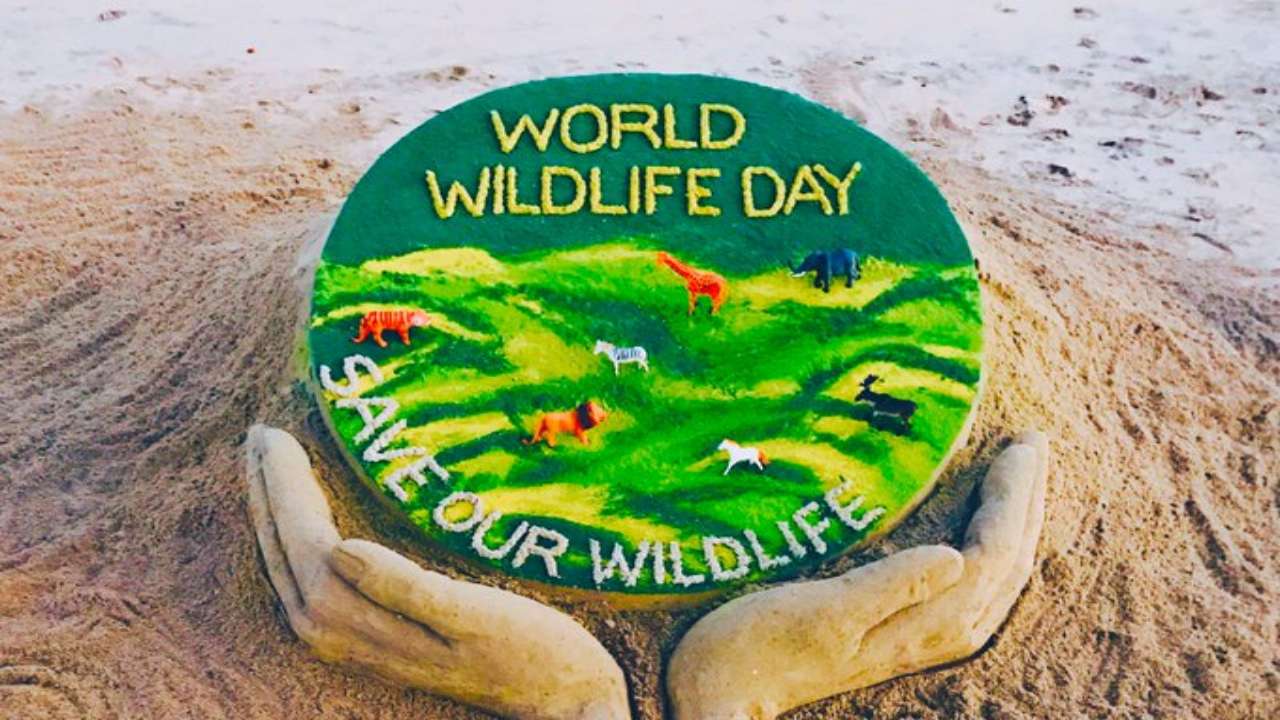03 March 2021 : World Wildlife Day

On 20 December 2013, at its 68th session, the United Nations General Assembly (UNGA) proclaimed 3 March – the day of signature of the Convention on International Trade in Endangered Species of Wild Fauna and Flora (CITES) in 1973 – as UN World Wildlife Day to celebrate and raise awareness of the world’s wild animals and plants.
The UNGA resolution also designated the CITES Secretariat as the facilitator for the global observance of this special day for wildlife on the UN calendar. World Wildlife Day has now become the most important global annual event dedicated to wildlife.
THEME OF WORLD WILDLIFE DAY 2021
"Forests and Livelihoods: Sustaining People and Planet"

Between 200 and 350 million people live within or adjacent to forested areas around the world, relying on the various ecosystem services provided by forest and forest species for their livelihoods and to cover their most basic needs, including food, shelter, energy and medicines.
Indigenous peoples and local communities are at the forefront of the symbiotic relationship between humans and forest, forest-dwelling wildlife species and the ecosystem services the provide. Roughly 28% of the world’s land surface is currently managed by indigenous peoples, including some of the most ecologically intact forests on the planet. These spaces are not only central to their economic and personal well-being, but also to their cultural identities.
Forests, forests species and the livelihoods that depend on them currently find themselves at the crossroads of the multiple planetary crises we currently face, from climate change, to biodiversity loss and the health, social and economic impacts of the COVID-19 pandemic.
On March 3 2021, World Wildlife Day will celebrate forest-based livelihoods and seek to promote forest and forest wildlife management models and practices that accommodate both human well-being and the long-term conservation of forests, forest-dwelling species of wild fauna and flora and the ecosystems they sustain, and promote the value of traditional practices and knowledge that contribute to establishing a more sustainable relationship with these crucial natural systems.
EVENTS
World Wildlife Day 2021 Virtual Global Event: World Wildlife Day is usually celebrated with a high-level event at the United Nations Headquarters in New York. Because of the COVID-19 pandemic, our 2021 celebration will be entirely virtual: we will be holding an online event, bringing together representatives of UN member States, UN System organizations and multilateral environmental agreements, civil society, and the private sector for a series of discussions along the theme of "Forests and Livelihoods: Sustaining People and Planet".
The preliminary agenda for the 2021 virtual event can be found here. This virtual event will be broadcasted live to the public – details on how to connect to the event will be made available here shortly.

HOW TO GET INVOLVED
Though we may not be able to meet in person, there are plenty still plenty of ways for you and everyone to take part in the 2021 World Wildlife Day celebrations, wherever you are.
World Wildlife Day has been observed in the in the past by people, groups and authorities around the world and in various ways. This year, we will get creative and take our passion for forests, forest species of wild fauna and flora, and for the well-being of forest communities around the world, online.
You can watch the World Wildlife Day celebration on 3 March and share it with your friends and your community. You can also spread the word of this year’s theme, “Forests and Livelihoods: Sustaining People and Planet” on social media and share links to the WWD Film Showcase and Youth Art Contest.
By simply taking an interest in this year’s events and celebrations, you too you can help raise awareness of forests, forest-dwelling wildlife and the efforts of forest communities, and therefore promote conservation and sustainable use of forest ecosystems and biodiversity.
There is plenty more you can do every day to support the message of World Wildlife Day. Here are some of our suggestions for this year's celebrations:
Get to know the forest ecoystems and wildlife species nearest to you and the threats they face. Find out more about the local and indigenous communities who live in or near forests, their livelihoods and how their knowledge and experiences can enlighten conservation efforts for forests and forest species around the world. You can look at the work of Indigenous and locally-led civil society groups like Alianza Ceibo, in Ecuador, or Vie Sauvage, in D.R. Congo, and learn about the novel paths to a sustainable relationship with nature towards which they are working. Share this knowledge with your family and friends.
Raise your voice and spread the word on social media: share your thoughts and upload a picture of yourself and those closest to you with our poster, or use our Social Media Kit for inspiration.
Use our hashtags for this year's celebration: #ForestPeoplePlanet; #WorldWildlifeDay; #WWD2021.
And do follow us on the official Twitter, Facebook and Instagram accounts of World Wildlife Day.
Bring World Wildlife Day with you to class or to the office, whether virtually or in person, and talk to colleagues, teachers, other students or educators about forests, forest wildlife and forest communities. Young people are the future leaders of wildlife conservation and we welcome their interest and involvement. A thriving planet, with healthy forest ecosystems that can sustain communities close to them and beyond, and a rich wildlife roaming through them are a cause well-wroth raising your voices for!
Everyday wildlife protection
Though World Wildlife Day is an annual celebration, wildlife conservation is an issue that needs attention and action every day.
The threats weighing on wildlife and biodiversity are often big and complex, so much so that individuals might feel powerless about them. However, every person’s small actions add up to a much larger solution, which can make the difference between species and ecosystems surviving and thriving and having them wane and even disappear.
Just #DoOneThingToday to make a difference and help wildlife conservation.
Set a Goal – Live your daily life with the smallest negative impact on the environment, wildlife, their habitats, or the planet’s biodiversity.
Mobilize – Encourage local schools, clubs, governments and businesses to discuss wildlife conservation and what you and your community can do to help.
Consume Responsibly – By not purchasing products made from illegally sourced, protected wildlife or their parts and products, you can stop wildlife trafficking from being a profitable enterprise. More information can be found through your national or local wildlife authorities or the Convention on International Trade in Endangered Species or Wild fauna and Flora (CITES).
Volunteer – We cannot always give money, but we can donate our time. Often wildlife organisations and zoos have volunteer programs. You could also help clean beaches, rescue wild animals or teach tourists about your local habitat.
Stay informed – Learn more about our planet’s flora and fauna, including those that are in danger of extinction. Research ways that you or your community can conserve and protect wildlife. Inform yourself on current environmental matters and be aware of your individual impact on ecosystems and wildlife. Think globally, act locally.
Speak up – Share your knowledge, passion and questions about wildlife conservation with your friends, family and community – either in person or online.
Reach out – inform authorities if you have information on illegal logging, fishing and wildlife trafficking; whistle-blowers play a critical role in detecting wildlife crimes and holding criminal smugglers accountable.
(Source : https://www.wildlifeday.org/)





 Virtual Library
Virtual Library Submit Book Review
Submit Book Review
No comments:
Post a Comment